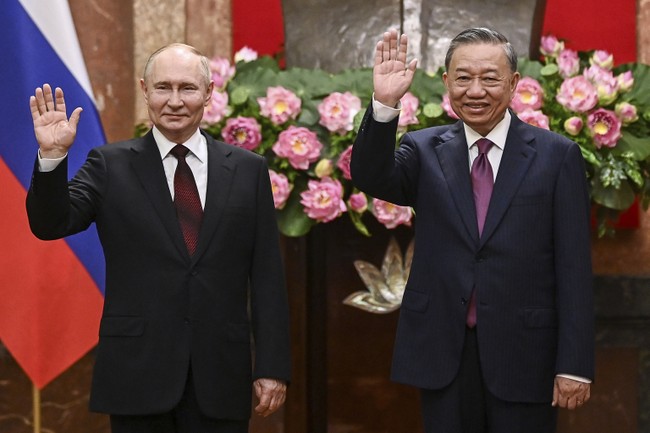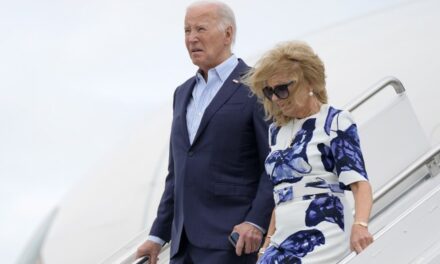We support our Publishers and Content Creators. You can view this story on their website by CLICKING HERE.

Russian President Vladimir Putin visited North Korea and Vietnam late last week. The purpose of the visit was both real and propaganda. On the propaganda side, Putin is trying to maintain the image of Russia as a power broker on the world stage instead of an isolated nation in a steep decline. Unlike his visit to China, Putin’s visit to Pyongyang did not bring widespread agreement that he had become a Chinese client. The real part is that Putin knows the best way to avoid the Western sanction crippling Russia’s armaments business is via East Asia.
Advertisement
During the visit to Pyongyang, Putin, and North Korean honcho Kim Jong Un entered into a “comprehensive strategic partnership pact.” Everyone understands what Kim got from the deal, and that would be help from Putin in busting UN sanctions. The first down payment was made when Russia, as a permanent member of the UN Security Council, vetoed the extension of the UN experts panel that assesses the implementation of UN sanctions on North Korea. It is less obvious what Russia got out of it.
The economic components, particularly the availability of North Korean slave guest workers. have been extended to Russia for years. Russia has been buying North Korean ammunition and missiles for a while.
BACKGROUND: Russia Buying Artillery Ammunition From North Korea Was Not on My Bingo Card – RedState
Russia consulting with North Korea over strategy in the Far East doesn’t seem like much of a thing. What has everyone interested is the “mutual defense” agreement between the two countries.
Article 4 [of the pact] states that should either country “get into a state of war due to an armed aggression” the other “shall immediately provide military and other assistance with all the means at its disposal.”
It is hard to see how that helps Russia because if things get to the point where Russia has to rely on North Korean military assistance, Putin is about a week from locking himself in his bunker. Russia attempting to intervene to save North Korea from some miscalculation doesn’t seem like much of a deterrent. After two years of watching the wildly incompetent Russian military in action in Ukraine, South Korea knows it has nothing to fear.
Advertisement
The part of the deal that doesn’t get enough attention is how this pact upsets the security applecart in northeast Asia.
To be sure, Beijing, Moscow, and Pyongyang share deep grievances about what they see as a U.S.-dominated global order. All three seek to erode Washington’s power and influence. But a key difference between Beijing and its two partners is that it seeks to achieve such an end without setting the world on fire or completely derailing its profitable ties with the world’s developed countries.
China needs a stable environment to deal with its myriad economic challenges at home and to manage trade tensions and de-risking efforts by Western states. China wants to move up the technology and innovation ladder and accelerate its military modernization, which Beijing believes is essential for compelling unification with Taiwan. In contrast, neither Russia nor North Korea has promising economic prospects or believes it benefits from a stable global order. This is why both countries have exclusively embraced violently disrupting the status quo.
In private conversations, Chinese observers, like their South Korean and American counterparts, express concerns about their lack of visibility on the military technology transfers being made between Russia and North Korea and the short- to long-term consequences of such transfers. They also share fears that Putin may be encouraging Kim to take destabilizing actions to distract the United States, raising the risk of war on China’s doorstep.
Advertisement
The military assistance pact may have had an unintended consequence. The South Korean government, which has thus far refrained from sending arms to Ukraine, announced it was reconsidering that policy in light of the new developments.
BACKGROUND: Putin Threatens South Korea With Something They Won’t Like If It Helps Ukraine
Seoul is fussing about the new Russia-DPRK Treaty. We’ll strictly fulfill it, including the articles on mutual security. But the relationship with South Korea will deteriorate further, considering their mindless joining the anti-Russian sanctions pic.twitter.com/PXbouqVg9p
— Dmitry Medvedev (@MedvedevRussiaE) June 24, 2024
Per a senior South Korean official on potential arms shipments to Ukraine:
“We will examine the areas that will hurt Russia the most.” https://t.co/6XsZh8LJMb
— OSINTtechnical (@Osinttechnical) June 20, 2024
The visit to Vietnam was more problematic. Although the US and Vietnam fought a 20-year war that resulted in a North Vietnamese victory, relations have warmed considerably. The US is Vietnam/s largest export partner. Russia gets fewer Vietnamese exports than Switzerland ($1.6 billion vs. $1.56 billion).
Though Russia and Vietnam signed several agreements, none of those made public were defense-related. There is one item that is virtually certain to cause heartburn in Beijing. Vietnam got a commitment from Russia to support Vietnam’s territorial claims in the South China Sea.
Vietnam and China have major disputes over economic zones in the South China Sea.
Advertisement
MANILA, Philippines — While the Philippines and China were busy wrangling over disputed islands and reefs in the South China Sea, Vietnam quietly expanded its territory by building islands, a report said. READ: https://t.co/I6oNnRx7fl pic.twitter.com/nplkZjUe0D
— The Manila Times (@TheManilaTimes) June 16, 2024
Vietnam and China fought a skirmish over Johnson South Reef in 1988. China’s actions in the same area against the Philippines have to have discomfited Hanoi.
Hanoi annually commemorates its loss in the Johnson South Reef fight.
Shortly after Putin left Hanoi, US Assistant Secretary of State for East Asia and Pacific Affairs Daniel Kritenbrink paid a visit during which Vietnam’s Foreign Minister Bui Thanh Son said:
Vietnam always regards the United States as a partner of strategic significance and is willing to work with the US to promote a comprehensive strategic partnership for effective, stable and meaningful development based on respect for each other’s independence, sovereignty, territorial integrity and political institutions, which is in the interests of the peoples of both countries for peace, stability, cooperation and development in the region.
On the whole, the trip doesn’t seem very well thought out, and the outcomes certainly do not improve Russia’s standing. Russia’s “mutual defense” pact with North Korea is not only worthless but also interferes in the affairs of a Chinese client state. Putin’s agreement to assist Vietnam in protecting its claims in the South China Sea puts him directly at odds with Xi.
Advertisement
Putin was already getting everything he needed from North Korea and it seems to me he was rolled by Kim Jong Un and left Pyongyang treating Kim as a peer.
In Vietnam, the visit by Assistant Secretary of State Kritenbrink, during which Hanoi was undoubtedly reminded of the role Vietnam’s exports to the US play in Vietnam’s economy, resulted in Hanoi reaffirming a “strategic partnership” with the US.
In short, it was the act of a desperate man who succeeded in drawing attention to his desperation.

 Conservative
Conservative  Search
Search Trending
Trending Current News
Current News 





